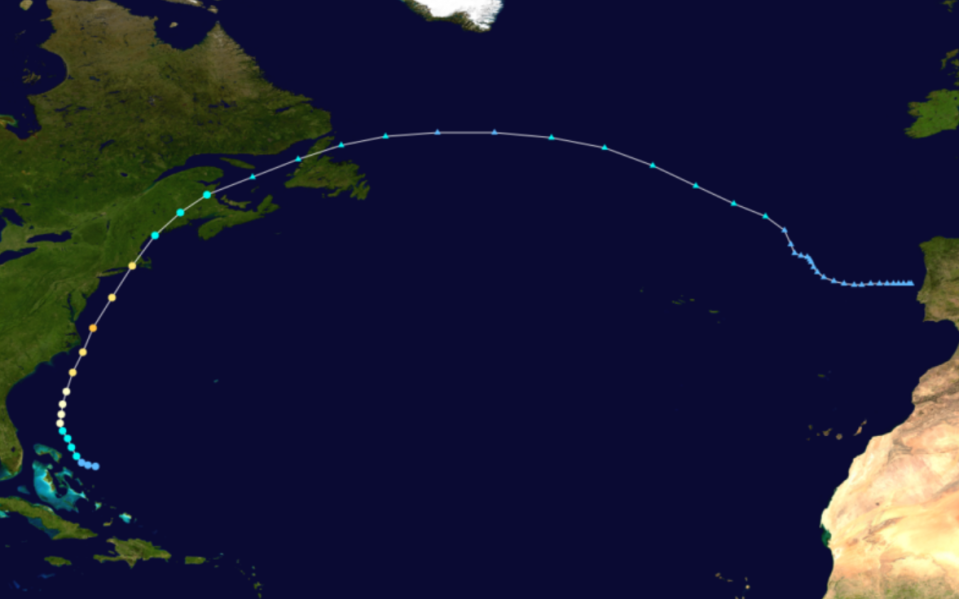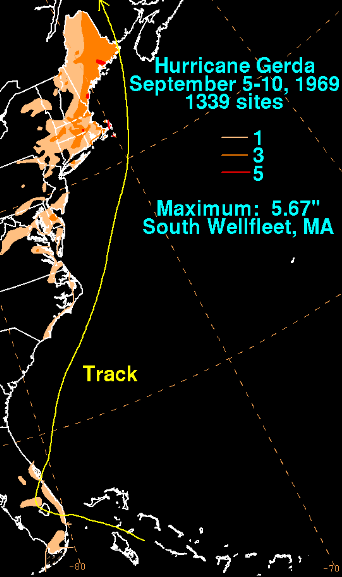Hurricanes Bob and Gerda: Remembering Maine's last two major storms as Lee nears
The National Weather Service’s Friday afternoon storm forecast noted that Hurricane Lee has lessened to a Category 1 hurricane. The storm is projected to make landfall in Nova Scotia Saturday night as a tropical storm, though Mainers and Granite Staters are being urged to be vigilant for potentially widespread impacts from the system. Downeast Maine was placed on a hurricane watch Wednesday night but that has since been downgraded to a tropical storm warning similar to the one issued for Seacoast NH and Southern Maine.
The difference between a tropical storm and a hurricane is the anticipated wind speed. Meteorologist Andy Pohl, stationed with the National Weather Service in Gray, Maine, explained that tropical storm warnings are issued in areas when wind speeds could range between 39 and 73 mph, while hurricane advisories are issued when wind speeds are projected to be between 74 and 110 mph.
When was the last time Maine was on hurricane watch?
Maine is no stranger to hurricanes, though it’s been generations since one made landfall in the state.
The last time parts of Maine were under an actual hurricane advisory came in August 1991, Pohl said.
According to the National Weather Service, Hurricane Bob, which developed around the Bahamas, was the second named storm and first hurricane of the 1991 Atlantic hurricane season. Originally beginning as a tropical storm, Bob became a hurricane while located east of Florida, then intensified to Category 3 hurricane status after coming into contact with the Outer Banks in North Carolina.

What impact did Hurricane Bob have?
As mandatory evacuation was ordered in the Outer Banks, an estimated 50,000 to 100,000 people left the region as the storm passed through, causing tornadoes in the state, power outages, heavy rain and about $8 million in damages in the state.
“Bob continued to move toward the north-northeast, steered by the flow between a mid to upper-level cut-off low near the Great Lakes, and a strong Atlantic subtropical high pressure ridge,” a National Weather Service narrative recalls. “In this steering flow, Bob moved parallel to the United States mid-Atlantic coast and headed toward New England on a track similar to the tracks of Hurricanes Carol and Edna 1954. Bob weakened while accelerating north-northeast over waters which became significantly cooler off of the mid-Atlantic coast.”
The eye of the storm passed east of Long Island, which suffered major power outages, though it hit New England, making landfall in Rhode Island and Massachusetts.
“Hurricane Bob howled into New England today after hammering Long Island and brushing the central East Coast with gusts up to 138 mph, and highways were snarled as vacationers and residents fled low-lying areas,” the Associated Press reported in August 1991. “High wind cut electrical service to thousands and many state government offices shut down.”
The National Weather Service noted that Hurricane Bob passed through Rhode Island and Massachusetts but began to weaken afterward, moving past the southern coast of Maine but making landfall as a tropical storm near Rockland, Maine on Aug. 20, 1991.
The storm took a turn northeast, exiting Maine and New Brunswick.
“Bob exited New Brunswick near Chatham and became extratropical over the Gulf of St. Lawrence,” the National Weather Service says. “It then crossed northern Newfoundland, and the central North Atlantic, before moving southeastward and dissipating near the coast of Portugal on August 29.”
When was the last time a hurricane made direct landfall in Maine?
Generations have passed, however, since the last time a hurricane made landfall in Maine.
In September 1969, a weak tropical disturbance combined with an upper cyclone near the Greater Antilles, traveling as a depression toward southeast Florida before heading back out over the ocean.
On Sept. 7, 1969, according to the National Oceanic and Atmospheric Administration, the system became a tropical storm and advanced northeast. The next day, the storm officially was deemed a hurricane, now known as Hurricane Gerda.
“The cyclone was moving at a forward speed of 40 (miles per hour) when it made landfall across the eastern tip of Maine by the evening of the 9th,” the National Oceanic and Atmospheric Administration says of the September 1969 storm.

The majority of Maine received between approximately one and five inches of rain as a result of the hurricane. South Wellfleet, Massachusetts received the highest rainfall total from Gerda, tallying 5.67 inches by the end of the storm.
AccuWeather notes that Hurricane Gerda was the only storm to ever make landfall in Maine dating back to 1900. Hurricane Gloria moved over Maine in 1985 but never made landfall, the weather company added.
“There was minor damage from Massachusetts up the coast, but no injuries or fatalities were reported,” AccuWeather says of Hurricane Gerda. “Hurricane Bob and an unnamed storm in 1944 both lost their hurricane status just before officially hitting the state (Maine).”
This article originally appeared on Portsmouth Herald: Hurricanes Bob and Gerda: Remembering Maine's last two major storms

